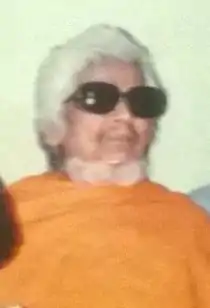Faturananda | |
|---|---|
 Faturananda at Rourkela | |
| Born | Rāmachandra Mishra 1 June 1915 |
| Died | 6 November 1995 (aged 80) |
| Parent(s) | Bidyādhar Mishra Subhadrā Mishra |
Rāmachandra Mishra (1 June 1915–6 November 1995), better known by his pen name Faturananda, was an Indian humorist and satirical writer in Odia.[1] He was the founder of the Sarasa Sāhitya Samiti, a literary organisation.[2] Mishra established "Kāntakabi Award" in the name of Laxmikanta Mohapatra. His early life was spent in struggling which is the core part of his autobiography Mo phutā dangāra kāhāni.[3] Mishra preferred "Faturānanda" as a pen name in all his writings.[1] Some of his popular writings include Nākatā Chitrakar (1953),[4] Sāhi Mahābharat.[5] His satirical writings in Odia were based on political reality and prevailing cynicism.[6]
Early life
Mishra was born on 1 June 1915 in Cuttack, Odisha to Bidyādhar Mishra and Subhadrā Mishra.[2]
Literary career
Faturānanda is well known for his distinctly unique and original style of writing. He uses simple and colloquial language with a natural flow. Underlying theme in all his works is social issues addressed either directly or indirectly.
According to Faturānanda “Stories I wrote initially were of tragic nature. After publication of “Dagaro” from Cuttack I started noticing the comic and humorous stories in it. Those were more or less of the same plot. For example, romance between a college boy and a college girl. Both decide to get married, but face some obstacle just before it. Finally the end of their romance. After seeing the same situation in all these published stories, I said – can’t there be any humor without these college boys and college girls. I made up my mind then and there not to ever include romance in my humor and satire. I have followed this principle ever since."
Awards and recognitions
- Orissā Sāhitya Academy
- Saralā Puraskār, Bhubaneswar
- Jadumani Sāhitya Sansada, Nayāgada
- Rādhānātha Pāthāgara, Sora, Bāleswar
- Saralā Sāhitya Sansada, Cuttack
- Utkal Pāthaka Sansada, Cuttack
- Nāgarika Sambardhanā, Rourkela
Bibliography
Autobiography
- Mo Phutā Dangāra Kāhāni, 1989[3]
Novel
- Nākatā Chitrakar, 1953[4]
Lyrical poem
- Sāhi Mahābhārata, 1987
Story collections
- Heresā, 1959
- Sāhitya Chāsa, 1959
- Bidushaka, 1963
- Mangalabāria Sāhitya Sansada, 1963
- Hasakurā, 1972
- Bruhat Bhānda, 1977
- Amruta Behiā, 1977
- Vote, 1980
- Gamāt, 1982
- Nidābehel, 1982
- Sāhitya Beushana, 1983
- Nabajiā, 1983
- Thatalibāj, 1983
- Sāhitya Bachābachi, 1983
- Maskarā, 1984
- Tāhuliā 1985
- Tāpuriā, 1986
- Muchukundiā, 1990
- Khilikhiliā, 1993
- Odishāra Spin Bowler, 1994
Poetry
- Nilathā Kabi, 1955
Play
- Kalikati Chenka, 1984
Children's literature
- Ajagabi Sikāra
- Nālura Chandra Yātra, 1991
Translations
- Ādarsha Hindu Hotel, 1977 - By Bibhutibhushana Chattopādyāya
- Bhāratara Shrestha Hāsyagalpa, 1980 - By Mujtabā Hossein
Other
- Famālochanā, 1987
- Faturānandanka Dusprāpya Rachanā, 1999
References
- 1 2 Link. United India Periodicals. 1973. Retrieved 6 June 2012.
- 1 2 Alonzo Simpson McDaniel (1990). The Absorption of Hydrocarbon Gases by Non-aqueous Liquids. University of Wisconsin--Madison. Retrieved 6 June 2012.
- 1 2 Sāhitya Akademi (1991). Indian literature. Sähitya Akademi. Retrieved 6 June 2012.
- 1 2 Ganeswar Mishra (1981). Voices against the stone: a brief survey of Oriya fiction. Agradut. Retrieved 6 June 2012.
- ↑ Karuna Sagar Behera; Jagannātha Paṭṭanāẏaka; Harish Chandra Das; Universe (Organization) (1990). Cuttack, one thousand years. Cuttack City Millennium Celebrations Committee, The Universe. Retrieved 6 June 2012.
- ↑ Sitakant Mahapatra (1978). The curve of meaning: studies in Oriya literature. Image Publications. Retrieved 6 June 2012.